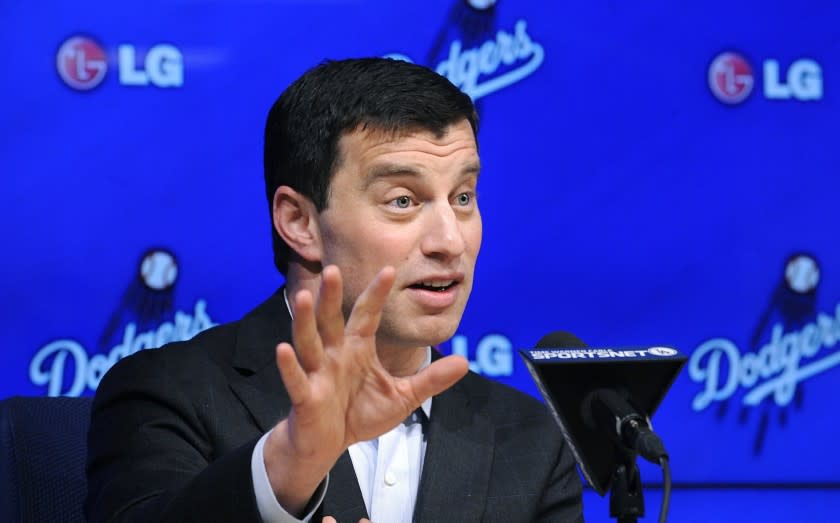Hernández: Dodgers again defer to process at trade deadline rather than acquire a starter

So, it’s back to Walker Buehler and Clayton Kershaw again, and that’s assuming the blister on Buehler’s pitching hand doesn’t turn him into a harder-throwing version of Rich Hill. As for the remainder of the Dodgers’ postseason rotation, that still has to be sorted out.
The trade deadline expired Monday without the Dodgers improving their suspect pitching or any other part of their roster. If anything, they temporarily weakened themselves by trading surplus starter Ross Stripling to the Toronto Blue Jays for a couple of prospects to be named later.
Their inactivity was completely on brand.
Think of how they don’t overcommit to any deal, unless it’s a mid-level free-agent contract that won’t seriously hurt them if the player fails to perform. This isn’t an organization that takes major gambles.
In a season in which a shameless cash grab by Major League Baseball bastardized an already questionable postseason format, there was virtually no chance the Dodgers would solve a short-term problem by trading coveted prospects.
“It’s certainly a factor,” president of baseball operations Andrew Friedman said. “It can’t not be.”
The playoffs will have an extra round this year, with the first round a three-game series.
“I definitely think it introduces more variance,” Friedman said.
If the three-game series is an argument against paying the typical trade-deadline surcharge for reinforcements, it’s also a reason to do what the second-place San Diego Padres did.
The shorter the series, the more valuable a frontline starting pitcher becomes, and the Padres obtained such a starter in Mike Clevinger from the Cleveland Indians.
The Padres have what is arguably the best farm system in baseball, and they used their prospect capital to acquire 10 players in six trades in the two days leading up to the deadline.
October will determine which approach was right — the Dodgers’ or the Padres’. This is a results-oriented business, after all.
In recent years, many front offices have talked about the importance of remaining process-oriented, a neat carnival trick to skirt responsibility when a season ends without a championship.
That isn’t to say organizational philosophies aren’t important. Obviously, they are.
The Dodgers have won seven consecutive division championships. They have a balanced roster and well-stocked minor league system that ensures they will remain competitive for the foreseeable future.
They owe this to the principles to which they have adhered since Friedman was hired to run their baseball operations department.
But trophies aren't awarded to the team with the best roster-building methodology. Cities don’t stage parades for teams that exercised the most discipline at trade deadlines.
Ultimately, a process is worth as much as the number of championships it delivers. So far, Friedman’s hasn’t won any.
Which could explain the adjustment Friedman made before spring training when he executed his first nine-figure investment.
At the time of his trade from the Red Sox, Mookie Betts technically cost the Dodgers only the outfielder’s $27-million salary, half of the $96 million David Price was owed over the next three seasons and three prospects. But the hope from the start was to sign Betts to a new contract, which the Dodgers did by extending his deal by 12 years for $365 million.
The Dodgers were one of the highest-scoring teams in baseball last year. They are again this year, but they now have in Betts their best hitter since Hanley Ramirez in 2013. There’s no way to entirely safeguard against a lineup disappearing in the postseason, but a hitter of Betts’ caliber is as close as it comes.
With a championship offense in place, the team’s World Series window is about as wide open as it’s been over the last three decades. Ordinarily, the opportunity would call for them to be more aggressive than usual at the trade deadline to improve the team’s pitching, perhaps to where they would be willing to overpay in ways Friedman has avoided in the past. But this isn’t an ordinary season. The expanded playoffs aren’t the only consideration, as there’s still a possibility the season could be shut down because of a COVID-19 outbreak.
“I think October looks different this year than it has in any other year,” Friedman said.
Friedman didn’t think that significantly affected what he did or didn’t do, but he conceded, “Of course, it’s something that’s at least on our minds.”
The result is the Dodgers will enter the postseason counting on Buehler and Kershaw to be dominant. They will hope for a capable playoff starter or two to emerge from a group that includes the still-injured Alex Wood, inconsistent Julio Urias, and inexperienced Dustin May and Tony Gonsolin.
This was the safe choice. This didn’t compromise their future.
But if the Dodgers don’t ever win a World Series under Friedman, this will be viewed in hindsight as one of the many opportunities they wasted by not pushing all in. They will wish they were as bold as the Padres.

